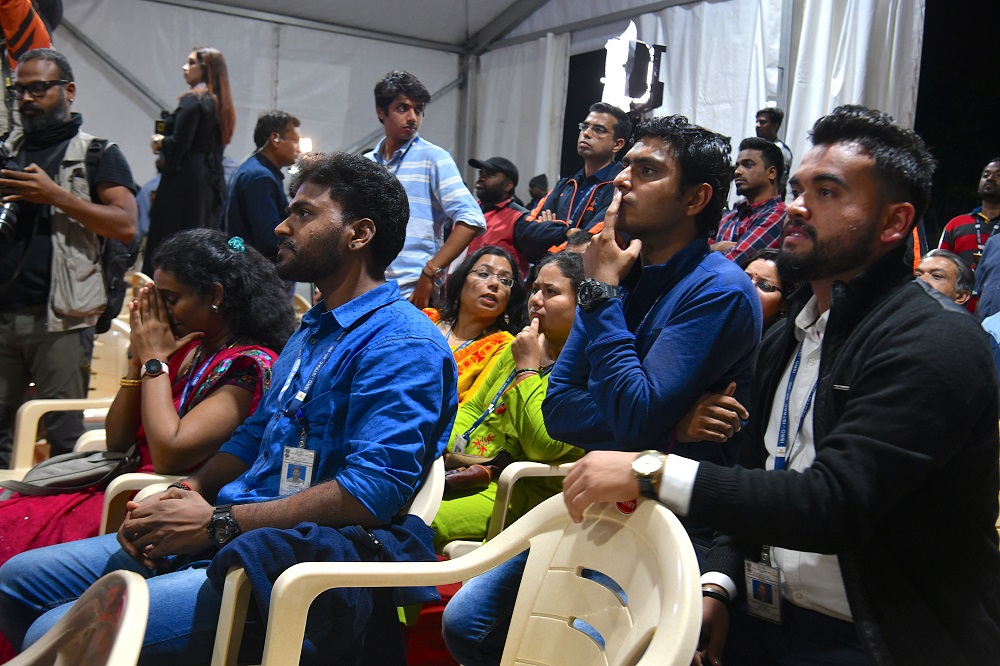Indian moon mission suffers setback
By Arunava Das in Kolkata, India | China Daily | Updated: 2019-09-09 09:47

India had been over the moon, as it were, preparing to celebrate a historic feat.
Instead, contact was lost with spacecraft Chandrayaan-2 moments before its Vikram module was to make a soft landing on the moon in the early hours of Sunday.
Kailasavadivoo Sivan, chairman of the Indian Space Research Organisation, or ISRO, said on Sunday afternoon that his agency had managed to locate the lander, Xinhua News Agency reported.
The spacecraft managed to shoot a thermal image of the lander on surface of the moon, media reports quoted him as saying.
By press time, the lander's condition was yet to be ascertained.
On Sunday morning, he was quoted as saying that the descent had gone "as planned and normal performance was observed till the altitude of 2.1 kilometers".
Contact was then lost between the control room in India's southern metropolis of Bangalore and the spacecraft 384,400 kilometers away.
The first words of consolation came from Indian Prime Minister Narendra Modi, who was at the tracking center to witness the final moments of the lander's scheduled descent. "In life, there are ups and downs. ... You have served the country well and served science and humanity well," Modi was quoted by local media as saying.
Launched July 22, the unmanned Chandrayaan-2 was India's chance to become fourth country to land a craft on the moon, following Russia, the United States and China. It intended to accomplish the first soft landing in the moon's south polar region.
Most importantly, analysts said, the failure denied the country a rare opportunity to search for water and minerals, and also explore minerals such as magnesium, ion and, importantly, helium. The technology of the spacecraft was 100 percent India-made and cost roughly $150 million.
Had the soft landing been successful, the landing module's Rover may have helped to solve the country's energy needs, according to a former ISRO scientist. "It could help bring helium-3 which is in abundance on the moon. The moon can become our one and only savior by meeting all the energy needs on Earth," Arup Dasgupta said.
Sandip Chakrabarti, director at the Indian Centre for Space Physics, said that the ISRO is still a powerful space agency.
Despite its current setback, India became the first Asian country to send an orbiter around Mars on May 5. It also has several ambitious space programs lined up.
Chakrabarti said that the ISRO has the potential to generate funds through commercial ventures.
Asked how India measured up to other countries boasting advanced space technologies, Chakrabarti said: "R&D in India is the weakest compared to the countries with strong space programs. Unless India strengthens R&D, it will be difficult to compete with China and other countries in the long run."
He said Chandrayaan-2 is doing what NASA did more than 50 years ago and China did by sending Chang'e 4, a robotic spacecraft mission to the moon in January this year.
Better engines
According to him, India needs to have better engines and rockets similar to Falcon of the US or Long March of China." (India's) missions are cheaper, but that cannot be the only criterion for winning the race. It must have a solid manned program. In this, China is also well ahead," Chakrabarti said.
He said if India wants to have a space station, manned missions must become routine. However, he does not foresee India having such a capability in the next few decades.
The country has planned to send a mission to study the sun in 2019-20, a second mission to Mars in 2022-23 and a Venus mission in 2023. It will also attempt to send astronauts to space on a spacecraft in 2022.
New Delhi-based electrical engineer Prasun Dutta said the ISRO deserves appreciation for contributing to the socio-economic development of people as well. "Many of ISRO's space programs are integral to (India's) essential needs and national development," he said.
He said ISRO's satellites provide nationwide connectivity in terms of voice and data communication. The country's space agency has launched programs such as telemedicine which network remotely located rural medical facilities to super specialty hospitals in big cities, Dutta said.
Satellite-based weather monitoring and warning system is of immense importance in a country where agriculture, a sector which provides livelihood to millions of people in rural segment but is still critically dependent on the vagaries of nature.
"ISRO's sensing satellites provide realistic data of India's land, surface water, ground water, forest and biological resources as inputs to policymaking for governmental authorities," he said.
Dutta added that the ISRO's disaster management support program provides space-based inputs which help in management and control of disasters like flood, cyclone, earthquake, forest fire, not only in India but also a few other countries.
Rajeswari Pillai Rajagopalan, distinguished fellow and head of the Nuclear & Space Policy Initiative at the Observer Research Foundation, said India's space explorations had positive implications beyond its borders.
India launched the first South Asian satellite to enhance communication channels and improve disaster links for its neighbors: Afghanistan, Bangladesh, Bhutan, the Maldives, Nepal and Sri Lanka.
The author is a freelancer for China Daily.
























